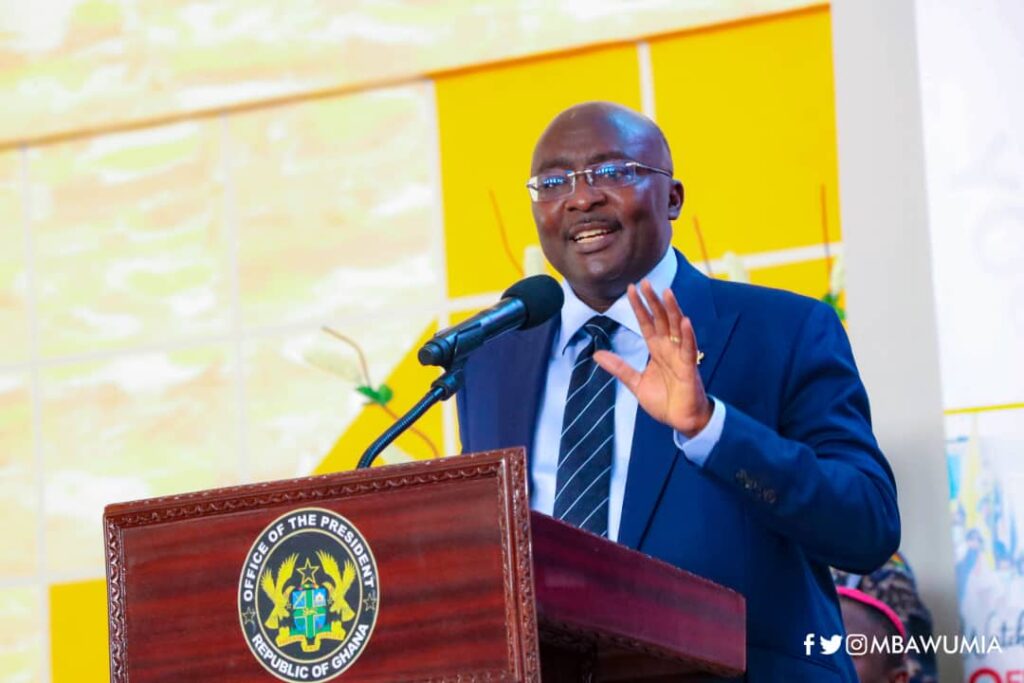Four childhood cancers now covered under NHIS – Bawumia

The treatment of four childhood cancers and the cost of hydroxyurea for managing sickle cell anaemia are now covered by the National Health Insurance Scheme (NHIS), Vice President Mahamudu Bawumia has said.
Addressing stakeholders in Accra, he said the re-imbursement of the cost for the treatment of childhood cancers took effect from July 1, 2022, while plans were afoot to add treatment of other forms of cancers to the NHIS list of ailments.
This was made possible because of a collaboration between the Scheme and Roche, a pharmaceutical company.
The Ghana Health Service says about 1,200 children are diagnosed of childhood cancers annually in Ghana, with parents spending between $1,000 and $10,000 for treatment.
“We have started with four cancers amongst children for now, but we are determined to expand in due course. As we know, incremental improvement is always the way and exponential impact should not be compromised when it comes to healthcare,” Vice President Bawumia said.
“Our children’s present and future can only be secured if all the factors that threaten their existence and quality of life are eliminated. We are determined to make it happen and we should not relent.”
A diagnosis of cancer often appears to be a death sentence, affecting not just the subject but the rest of the family and entire community, unless well-structured and well-resourced interventions were at play to curb the burden.
“In many developing countries, cancer is on the rise and its consequent effect on economies, is and will be grave, if nothing is done to control it,” he noted.
Vice President Bawumia said many countries had attempted to curb the spread of childhood cancers, however, the perception of exorbitant costs of management and treatment had undermined those efforts.
In Ghana, childhood cancers had shown significant success rates in achieving desired management outcomes and often at manageable cost.
“I am glad that we, as a nation, are putting our children first and protecting them and their dreams. Sometimes, it is good to look at the value of investments and not just the cost,” he said.
Dr Bawumia enjoined all stakeholders to bring their resources to the table to make the programme successful and sustainable.
“For most things to be sustained funding is required: good funding streams enable projects to be sustained and this is same in childhood cancers and other disease areas.
“It requires us to be collectively innovative in proffering solutions and investing in it and all other factors that will ensure the best outcomes.
“For a health project such as this great childhood cancer services to continue, all stakeholders need to bring their resources to the table – expertise, awareness creation, early detection, treatment etc should be made available,” he said.
“The successful outcomes of seeing that our children are being diagnosed early and treated and recovering will certainly encourage the NHIA and all other partners to continue to fund the services. We all have a role to play.”
The Vice President highlighted the importance of technology, effective collaboration and data in health management, saying there were multiple players in healthcare that required data for valuable investments, with health data actually generating income for some countries.
He said clinical trials, research, and budgeting required data and called on stakeholders to prioritise data capture related to childhood cancers and other cancers to ensure healthcare investments were well informed.
“For a middle-income country, every cedi we spend must be well thought through and I believe data will enable the government to do so,” he said, and called for reduction in wastage to ensure sustainability.
The desire to ensure a greater geographical spread of access to healthcare, especially for persons who require specialist care and medication, was the reason behind initiatives such as One Constituency One Ambulance.
Others were the medical drones for the delivery of essential medical supplies and blood, and the Agenda 111 projects, which would see to the construction of district hospitals as well as the construction and or upgrading of regional hospitals across the country.
“What we have achieved here is no mean feat and we should not underestimate it,” the Vice President said, and commended all who contributed to achieving the feat.
Dr Bernard Okoe-Boye, the Chief Executive Officer of the NHIS, said the Scheme was putting in place the necessary modalities to ensure that the Ghana Card was used as a primary identity for accessing healthcare.
He assured of its determination to leverage on data and technology to improve access to healthcare towards achieving the Universal Health Coverage by 2030.
Source: GNA
